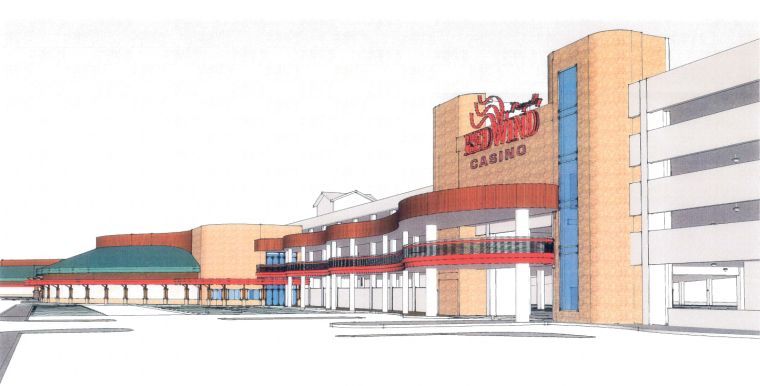Construction Starts Next Month; Completion Set for December 2014

An artist’s drawing shows what the Red Wind Casino will look like once a $45 million expansion project is completed. Work is set to begin in November on the project, which will add 42,700 square feet of floor space to the casino, including a non-smoking section. The project will be completed in December 2014.
October 23, 2013 Nisqually Valley News
By Nomee Landis nlandis@yelmonline.com
OLYMPIA, WA – A $45 million expansion of the Nisqually Red Wind Casino will bring 70 new jobs to the area and will continue to fuel a significant economic expansion that has occurred within the Nisqually Indian Tribe in the last year, said Cynthia Iyall, chair of the Nisqually Tribal Council.
Construction is set to begin on the casino expansion project next month and will be completed by December 2014. In all, 42,700 square feet of gaming space will be added to the current 95,000-square-foot structure. A remodeling of the parking structure will add 600 spots. The expanded space will include a smoke-free casino.
Only about 1 percent of the roughly 400 employees at the casino are members of the Nisqually Tribe, Iyall said. Many of the tribe’s 766 members are employed in tribal government positions; there are about 300 such positions.
“We rely on the surrounding community for employment, and it seems to be a good partnership,” Iyall said.
The remodeled and expanded casino will carry on with a natural elements theme begun with the construction of the Tribal Center. That building’s roof is curved to
reflect the back of a fish and the flowing Nisqually River. The old tribal building behind it is being remodeled with a pitched roof, which is reflective of a mountain, Iyall said. The upgraded casino building will incorporate grass-like elements because the Nisqually Tribe’s historic name, Schally-Absch, means people of the river and people of the grass country, Iyall said.
The original casino, which was built in 1997, is the tribe’s economic engine, Iyall said, and revenues from that business have allowed the tribe to expand its economic presence in the region. Four new tribal businesses have opened within the past year alone. The tribe has a new construction company called Nisqually Federal WHH Construction.
The tribe opened a seafood processing plant, called She-nah-num Seafood, in Tumwater about six months ago. Tribal fishermen sell their catch to the plant, which processes it and prepares it for retail sale. Then the seafood is purchased by casinos, buffets and fine-dining restaurants up and down the coast.
The tribe has also opened two convenience stores, the Nisqually Market in Lakewood and the Nisqually Market Express in the Nisqually Valley near Interstate 5. Both of those have opened within the past year, Iyall said.
“We utilize our gaming as a springboard to get into other types of businesses for the tribe,” Iyall said. “It is the engine of our economic development. With a portion of these funds, we have been able to diversify our economy on and off the reservation, strengthening our sovereignty and building the tribe for the future.”
The money generated from those jobs brings security into tribal homes, Iyall said. There are just so many positives from the casino operation, she added, and the expansion will help spur future economic growth.
The casino earnings will also help fuel an upgrade of the convenience store on the reservation, the Rez-Mart. That project will begin soon and will add products and services, including perhaps a post office and office space, Iyall said.
In addition to these projects, the tribe is also extending its wastewater treatment system and is building a public safety complex, according to a statement provided by Iyall.
“The Nisqually Tribe is investing in the future,” Iyall said in that statement. “The tribal council wants to provide long-term opportunities for our members and their families — opportunities for good jobs, good health care, good homes and good education. We especially want to provide quality care for our elders.”
The tribe contributes more than $1 million each year from casino revenues to charitable and nonprofit organizations and local governments that extend the benefits of the operation into the surrounding communities, according to the statement. The current casino boasts three restaurants, 975 video lottery terminals and an assortment of gaming tables.
The tribe’s Medicine Creek Enterprise Corp. manages the casino. That corporation is chaired by John Simmons.
“We’re proud of the casino’s success,” Simmons said in the statement, “and we welcome the opportunity to keep growing, to keep generating income and to benefit our members.”
Korsmo Construction will be the general contractor for the expansion, according to a statement. That is the same company that built the new Tribal Center across the street from the casino. KMB Designs is the architect for the project.






